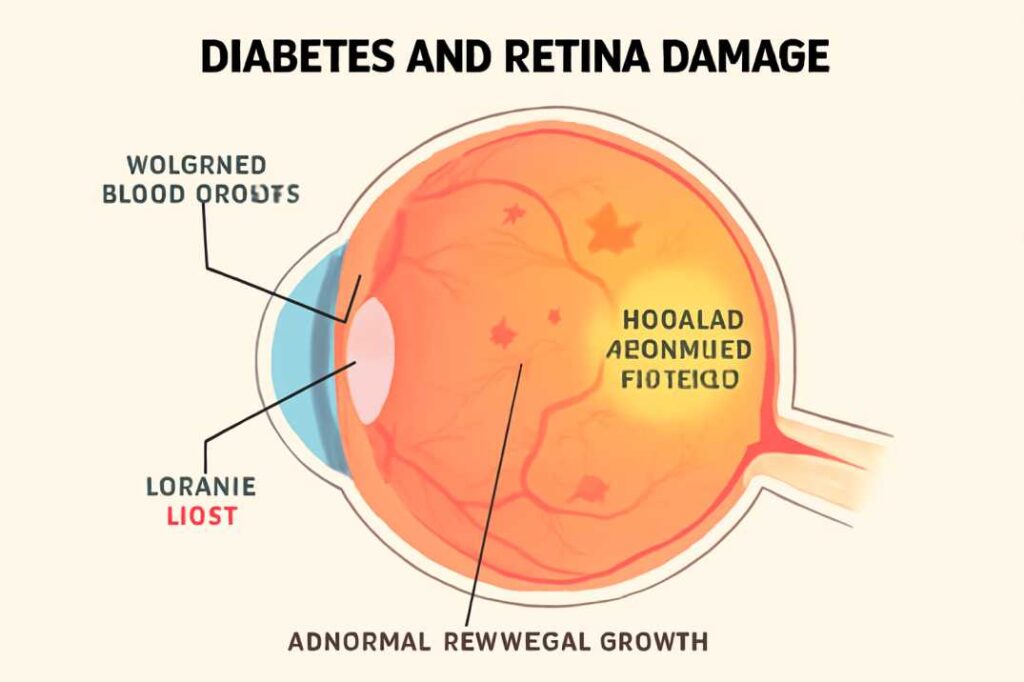Why Eye Care is Particularly Important if You Have Diabetes
Living with diabetes in the Pacific Northwest means managing more than just blood sugar levels. Your eyes need specialized attention, and understanding why can save your sight. At Cannon EyeCare, we see firsthand how early intervention transforms outcomes for Seattle’s diabetic community.
How Diabetes Steals Your Sight: A Silent Threat to Vision
While you may feel fine, consistently high blood sugar acts like a corrosive agent, systematically damaging your body’s most delicate blood vessels. Nowhere is this more devastating than in your eyes. The retina, which is the light-sensitive tissue at the back of your eye, contains a vast network of these tiny, fragile vessels, making it a primary target for diabetes complications.
This constantly elevated blood glucose causes what our Seattle eye doctors see as a four-stage assault:
-
Weakening and Leakage: Vessel walls become damaged and porous, leaking fluid and blood into the retina.
-
Blocked Blood Flow: Critical areas of the retina are starved of essential oxygen and nutrients.
-
Abnormal Growth: Frail, new blood vessels begin to grow, which are highly prone to rupture.
-
Central Swelling: Fluid buildup in the macula—the part of the retina responsible for sharp, central vision—causes blurring and distortion.
The Four Primary Diabetic Eye Diseases
Left unmanaged, this damage crystallizes into specific sight-threatening conditions:
-
Diabetic Retinopathy: The most common cause of vision loss, affecting over 80% of long-term diabetics. It involves direct damage to the retina’s blood vessels.
-
Diabetic Macular Edema (DME): A consequence of retinopathy where fluid leaks into the macula, threatening the core of your detailed vision.
-
Glaucoma: Diabetics face a 40% higher risk of developing this disease, which damages the optic nerve due to increased pressure inside the eye.
-
Cataracts: Those with diabetes tend to develop cataracts earlier—often 5 years or more before their non-diabetic peers—causing the eye’s natural lens to become cloudy.
A Groundbreaking Discovery for Seattle Patients: A landmark 2025 study revealed a hidden factor accelerating this damage. Researchers found diabetes causes a 40% reduction in protective DHA levels in the retina. This critical fatty acid is essential for retinal health, meaning the damage extends far beyond what blood sugar levels alone can explain. At Cannon EyeCare in Seattle, WA, we stay at the forefront of this research to protect our patients’ vision with the most advanced understanding of diabetic eye disease.
Who’s at Risk and When to Begin Diabetic Eye Exams in Seattle
Understanding your personal risk factors is the first step toward preserving your sight. While all individuals with diabetes require vigilant care, certain factors significantly elevate the threat to your vision.
Key Risk Factors for Diabetic Eye Disease
Our Seattle optometrists at Cannon EyeCare emphasize that your risk escalates with:
-
Duration of Diabetes: Your risk of developing retinopathy approximately doubles every five years after your initial diagnosis.
-
Poor Blood Sugar Control: Maintaining an A1C level consistently above 7% dramatically accelerates the rate of eye complications.
-
High Blood Pressure: Hypertension compounds the damage to your retina’s delicate vascular system.
-
Pregnancy: Gestational diabetes requires immediate and specialized diabetic eye exam monitoring to protect both mother and baby.
-
Genetic History: A family history of diabetic retinopathy can increase your predisposition, affecting nearly a quarter of all cases.
The Seattle-Specific (Pacific Northwest) Considerations
Living in the Emerald City comes with unique lifestyle factors that can influence diabetic eye health:
-
Dramatic Seasonal Light Changes: The shift between dark, grey winters and bright summers can affect light sensitivity and adaptation for diabetic eyes.
-
Active Outdoor Culture: Hiking, skiing, and water activities mean Seattle diabetics need to be exceptionally diligent about UV-protective sunglasses to prevent additional retinal stress.
-
Dietary Habits: High coffee consumption, a staple of Pacific Northwest life, is a factor to discuss with your doctor as it can influence blood pressure, a key risk factor.
When Should You Schedule Your First Diabetic Eye Exam?
The timeline is critical and depends on your diagnosis. Do not wait for symptoms to appear, as damage is often silent until it’s advanced.
-
Type 1 Diabetes: Begin comprehensive annual eye exams five years after your initial diagnosis. If diagnosed before puberty, screening should begin at puberty.
-
Type 2 Diabetes: Schedule an exam immediately upon diagnosis. Damage to the blood vessels in the eyes may have already begun years before you were diagnosed.
-
Gestational Diabetes: Require monitoring throughout your pregnancy and for one year postpartum. Your Seattle eye doctor will create a specific monitoring plan
What to Expect During Your Diabetic Eye Exam in Seattle
A diabetic eye exam at Cannon EyeCare is a comprehensive, painless process designed to detect the earliest signs of trouble long before you notice vision changes. Far more than a standard vision check, it is a critical evaluation of your retinal health and a window into how well your diabetes is being managed.
Our Comprehensive Diabetic Examination Process
Your diabetic eye exam at our Seattle clinic is a thorough assessment that typically takes 45-60 minutes and includes:
-
Detailed Medical History Review: We discuss your diabetes management, A1C levels, and overall health to understand your complete risk profile.
-
High-Definition Digital Retinal Photography: We capture wide-angle images of your retina, creating a permanent baseline record to track subtle changes year over year.
-
Optical Coherence Tomography (OCT): This advanced 3D cross-section imaging allows our Seattle optometrists to see and measure individual layers of your retina, detecting microscopic swelling (edema) that is invisible to the naked eye.
-
Dilated Pupil Examination: While it may temporarily blur your vision, dilation is essential. It gives our doctors a complete, unobstructed view of your entire retina, including the peripheral blood vessels most vulnerable to diabetic damage.
-
Tonometry: This quick test measures the pressure inside your eye, a crucial step in screening for glaucoma, for which diabetics are at higher risk.
-
Visual Acuity Testing: We establish a baseline for your central vision clarity.
This multi-faceted approach provides invaluable data on your current eye health and the overall effectiveness of your diabetes control.
Understanding Your Diagnosis and Next Steps
After your exam, your eye doctor will clearly explain the findings and classify any signs of diabetic retinopathy. Your results will fall into one of these categories, which dictate your personalized care plan:
-
No Retinopathy: Excellent news. This means no signs of damage were found. You will continue with annual diabetic eye exams to ensure ongoing health.
-
Mild Nonproliferative Retinopathy: Early, minor signs are present. We will likely recommend more frequent monitoring, often every 6-9 months, to watch for any progression.
-
Moderate to Severe Nonproliferative Retinopathy: More significant damage is evident. We will discuss increasing the frequency of monitoring and may recommend consulting a retinal specialist to discuss preventive treatment options to halt progression.
-
Proliferative Retinopathy or Macular Edema: This signifies sight-threatening damage that requires immediate intervention. Our team will facilitate an urgent referral to a top retinal specialist in the Seattle area for prompt treatment to preserve your vision.
Evidence-Based Prevention Strategies to Protect Your Vision
Protecting your sight from diabetes requires a proactive, multi-faceted approach grounded in the latest clinical science. At Cannon EyeCare in Seattle, WA, we empower our patients with strategies that go beyond the clinic and integrate seamlessly into daily life.
The Diabetes ABCs: The Foundation of Eye Health
Modern guidelines pinpoint three non-negotiable treatment targets that directly correlate with retinal health:
-
A1C Control (Blood Sugar):
-
Target: Maintain an A1C below 7% for most adults.
-
Impact: For every 1% reduction in your A1C, you achieve a 15% reduction in your risk of developing or worsening retinopathy.
-
Tool: Utilize Continuous Glucose Monitoring (CGM) systems for real-time data and better daily management.
-
-
Blood Pressure Management:
-
Target: Aim for blood pressure below 130/80 mmHg.
-
Impact: Uncontrolled hypertension doubles the risk of diabetic retinopathy progression by compounding damage to delicate retinal vessels.
-
Local Advantage: Embrace the Seattle and Pacific Northwest’s access to heart-healthy foods like wild-caught salmon and leafy greens to support this goal naturally.
-
-
Cholesterol & Medical Management:
-
Breakthrough: The medication Fenofibrate, independent of its cholesterol-lowering effects, has been shown to reduce significant eye complications by 34%.
-
Action: Discuss with your primary care doctor if this evidence-based treatment is appropriate for your overall diabetes management plan.
-
Nutritional Interventions: The Power of Your Plate
Cutting-edge 2025 research confirms that targeted nutrition is a powerful tool in defending your retina.
-
DHA Supplementation Protocol: High-dose Docosahexaenoic Acid (1,000 mg daily), especially when combined with vision-specific carotenoids (Lutein and Zeaxanthin), has been proven to significantly improve macular function in patients with early retinopathy in as little as three months.
-
Seattle-Specific Nutritional Recommendations:
-
Incorporate wild Pacific salmon 2-3 times per week for a potent, natural source of DHA.
-
Eat dark leafy greens like kale and spinach year-round from local farmers’ markets to boost your macular pigment.
-
Enjoy seasonal blueberries in the summer for their powerful antioxidant protection.
-
Consider a Vitamin D supplement during our dark Seattle winters to support overall metabolic and immune health.
-
Home Monitoring: Your First Line of Defense
Early detection of changes is critical. Integrate these simple tools into your routine:
-
Amsler Grid:
-
Test each eye weekly in a well-lit room.
-
Note any new wavy lines, blurry spots, or distortions.
-
Contact your Seattle eye doctor immediately if you detect any changes.
-
-
Technology Integration:
-
Use apps like MyDiabetes to track blood sugar trends and log any vision symptoms.
-
Consider home devices like EyeQue for personal vision tracking or Peek Acuity for quick acuity checks, sharing any concerning results with our clinic directly.
-
Modern Treatment Options: Advanced Care When You Need It
If your diabetic eye exam reveals signs of damage, know that modern medicine offers highly effective treatments to halt progression and preserve your vision. At Cannon EyeCare, we provide access to the current gold standard of care and stay at the forefront of breakthrough therapies available in the Seattle medical community.
Current Gold Standard Treatments
Today’s most proven treatments focus on stabilizing the retina and preventing further vision loss.
-
Anti-VEGF Injection Therapy:
-
Effectiveness: This is the first-line treatment for diabetic macular edema, with a 95% success rate in halting disease progression and often improving vision.
-
Process: Medication is injected directly into the eye to block the protein (VEGF) that causes leaky blood vessels and swelling. Treatment starts with monthly injections, then transitions to an as-needed schedule.
-
Access: This procedure is typically covered by insurance and is performed by our affiliated retina specialists at multiple locations throughout Seattle, including our clinic.
-
-
-
Focal Laser Photocoagulation: Precisely targets and seals specific leaking blood vessels in the macula.
-
Panretinal Photocoagulation (PRP): A broader laser treatment applied to the peripheral retina to reduce abnormal blood vessel growth (proliferative retinopathy) and help preserve central vision.
-
Selective Laser Trabeculoplasty (SLT): An effective laser treatment option for patients who develop glaucoma as a complication of their diabetes.
-
Breakthrough and Emerging 2025 Treatments
The future of diabetic eye care is here, with several promising developments on the horizon.
-
Gene Therapy Developments: The next frontier involves treatments that target the underlying genetic signals for vascular dysfunction. These emerging therapies aim to help the eye manage VEGF levels itself, potentially requiring far fewer injections over a patient’s lifetime.
-
AI-Assisted Diagnosis and Prognostics: Leveraging our position in a major tech hub, Seattle patients have early access to cutting-edge artificial intelligence screening programs. These powerful systems can analyze retinal images with incredible precision, detecting subtle patterns of retinopathy up to two years earlier than traditional clinical methods. This allows for preemptive treatment before significant damage ever occurs.
Our doctors at Cannon EyeCare will carefully review all available options with you, ensuring you understand the best, most evidence-based path forward to protect your sight.
Addressing Cost and Insurance: Your Guide to Affordable Care in Seattle
We believe clear vision should be accessible. Understanding your coverage and the resources available is a critical part of your care plan. At Cannon EyeCare in Seattle, WA, we help our patients navigate the financial aspects of diabetic eye health with clarity and confidence.
What’s Typically Covered by Insurance in Washington State
Most health insurance plans, including those in the Washington state exchange, provide robust coverage for diabetic eye care as it is deemed essential preventive medicine.
-
Annual Comprehensive Diabetic Eye Exams: Under the Affordable Care Act (ACA), these are considered preventive care and are typically covered at 100% with no out-of-pocket cost to you.
-
Advanced Diagnostic Testing: Medically necessary imaging like Optical Coherence Tomography (OCT) and retinal photography is covered when ordered to diagnose or monitor a condition.
-
Medically Necessary Treatments: Procedures like Anti-VEGF injections for diabetic macular edema or laser therapy are covered by insurance when deemed medically necessary by your doctor.
-
Follow-up Monitoring: Appointments to monitor the progression of diagnosed eye disease are covered based on established medical necessity.
Patient Assistance and Seattle-Specific Resources
If you are uninsured, underinsured, or face high co-pays for treatments, significant help is available.
-
Pharmaceutical Patient Assistance Programs: Major drug manufacturers offer programs that provide medications at little or no cost to eligible patients.
-
Genentech Access Solutions: For patients requiring Lucentis® (ranibizumab)
-
Regeneron Patient Assistance: For patients prescribed Eylea® (aflibercept)
-
Bayer Patient Assistance: For Eylea HD®
-
-
Local Seattle and King County Resources: Our community offers excellent safety-net programs.
-
HealthPoint Community Health Centers: Operates multiple locations offering care on a sliding scale fee based on your income.
-
Harborview Medical Center: Provides charity care and financial assistance programs for King County residents.
-
Swedish Medical Center: Offers financial assistance applications for those who qualify.
-
Thriving in Seattle with Diabetic Eye Disease
A diagnosis of diabetic eye disease is a call to action, not a reason for despair. With modern treatment and strategic lifestyle adaptations, you can live a full, active life while protecting your vision. Here’s how to build a successful management plan in the Pacific Northwest.
Mastering Treatment Adherence: Your Appointment Strategy
Consistent follow-up is the single greatest predictor of successful outcomes. Recent studies highlight that male patients and those living in more remote areas are at highest risk of missing crucial appointments.
-
Plan Far Ahead: Schedule your next 2-3 injection or monitoring appointments 6 months in advance to secure slots that fit your life.
-
Simplify Transportation: Utilize King County Metro’s Trip Planner or a rideshare service on appointment days to eliminate stress.
-
Find Your Community: Join a diabetic support group at Swedish Medical Center or another local organization to share experiences and stay motivated.
-
Track Your Journey: Keep a simple journal to note symptom changes and vision improvements; this tangible record reinforces the positive impact of your consistency.
Smart Lifestyle Adaptations for Seattle Living
Protecting your vision means adapting your environment and activities. These practical changes minimize strain and maximize your independence.
-
Work & Home Office Setup:
-
Request a larger computer monitor and software that allows for font size enlargement.
-
Invest in high-quality, adjustable task lighting to reduce glare and shadow.
-
Use voice-to-text software for drafting emails and documents to rest your eyes.
-
Discuss flexible scheduling with your employer to accommodate medical appointments.
-
-
Enjoying the Seattle Lifestyle Safely:
-
Hiking & Outdoors: Use trekking poles on our local trails for enhanced stability and depth perception. Prioritize hikes on clear, sunny days over overcast or twilight hours.
-
Driving: Be cautious with night driving, especially during periods of active treatment or adjustment. Seattle’s rainy conditions require extra vigilance.
-
Reading & Culture: Take full advantage of the Seattle Public Library’s extensive collection of large-print books and audiobooks.
-
Daily Tasks: Install bright, focused lighting under kitchen cabinets and in workspaces to prevent eye strain during detailed tasks like cooking.
-
Your vision is irreplaceable. While diabetes presents serious risks to your eyesight, modern eye care offers unprecedented protection when you act proactively. The combination of regular monitoring, optimal diabetes management, and cutting-edge treatments means that vision loss is largely preventable.
The choice is yours: wait for symptoms that may never come until it’s too late, or take charge of your eye health today. Seattle’s diabetic community has access to world-class eye care—use it.
Ready to protect your vision? Contact Cannon EyeCare today to schedule your comprehensive diabetic eye examination. Your future self will thank you.
FAQs
-
People with diabetes should get a comprehensive dilated eye exam annually. Type 1 diabetics start 5 years after diagnosis, while Type 2 diabetics begin immediately upon diagnosis.




